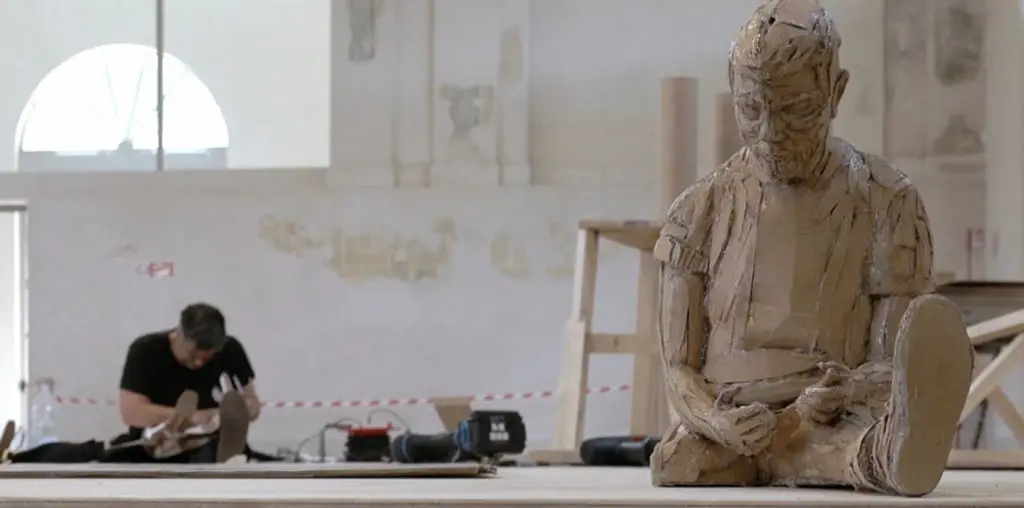
Mark “Gator” Rogowski sat on the “vertical skating” throne for much of the eighties, riding the same wave of extreme skateboarding popularized by Tony Hawk and Christian Hosoi. However, like a stale television series or trendy music genre, the sport soon lost its commercial appeal, leaving such skating icons to waste away in the dust of obscurity.
“Stoked – The Rise and Fall of Gator” is a cautionary tale exploring the disastrous consequences of sudden fame followed by faltering fortune. Its hero – once a symbol of alternative culture’s rebel voice – eventually sells out big-time, then caps off his descent by raping and murdering a female acquaintance. This diabolical act is made all the more repellent after we’ve gotten to know Rogowski. Like news of a flawed friend landing in jail for lawless misdeeds, we grimace even as we question whether such a fate was inevitable.
Director Helen Stickler launches her sports saga in 1982, establishing Rogowski as an aggressive hero of “vert” skating, in which practitioners use ramps and empty swimming pools for radical, four-wheeled jumps and flips. “Fear is a mindkiller,” Gator exclaims before flying across the periphery like a drunken, airborne insect, demonstrating the board acrobatics that he’s known for.
Meanwhile, Stickler fills the audio with crackly telephone messages from Gator, as newspaper headlines and overhead prison shots crowd the screen. The ominous combination of sound and images make it clear that the skate star is narrating his history from a confined cell (California laws prohibited Stickler from filming her subject in prison), and that something awful has occurred. Skate fans will already know the story. For the rest of us, Stickler slowly exposes the subculture that Rogowski helped create, before re-approaching his crime for a devastating finale.
We’re introduced to the dawn of Southern California skatedom, informed of the different styles and methods that defined skaters from Venice, Oceanside, and other active boarding communities. A board-bum explains that initially, skaters never expected to make money or see their sport go pro. “We made $50 a month if we were lucky,” he shrugs.
Inevitably, vertical skating became a viable commercial industry, as skate parks opened, “Thrasher” magazine emerged as the genre’s information Bible, and companies like Vision marketed skateboard accessories and clothing. “Mark became an icon for the company,” boasts Vision’s founder, who marketed his poster child in dozens of promotional videos.
Played in skate stores across the country, such VHS tapes portrayed Gator as a rebel rock star, escaping the clutches of a nagging mom as he hits the streets in search of board action. Meanwhile, the increasingly visible skating presence was seen donning Vision’s sizeable array of shirts, pants, and watches. “We had a concept of big logos that distinguished wearers as part of the skateboarding subculture,” explains a Vision spokesman.
Eventually, Rogowski was pulling in over $20,000 per month through such lucrative endorsement deals, buying real estate, and enjoying such excessive celebrity perks as willing women (the subculture’s groupies are known as “Skate Bettys”) and free-flowing booze. It wasn’t long before the successful icon’s dark side began taking over. During a skate tournament, Rogowski punched a police officer. “The moment Mark punched that cop,” confirms a fellow skater, “it cemented his legend.”
Stickler is clearly fascinated by the image of skating as a vicarious form of acting out aggression, and how its participants sometimes have difficulty knowing where to draw the line. “There’s always been this crux of skateboarding and rebelliousness,” acknowledges Stacy Peralta, “and it’s because everywhere you go to skateboard, or everywhere you used to go to skateboard, you were kicked out and told not to do it.”
Other members of the subculture agree. “In a lot of places,” says John Hogan, “skateboarding was outlawed. I mean, just putting your board down on the ground was considered illegal.”
“It’s a very thin line between presenting yourself as a true skater and hardcore,” observes Lance Mountain, “and not being destructive.”
With this in mind, it’s understandable that Gator’s public persona comes into question during the late eighties, as he’s caught on film decked out in puffy pants, schmoozing with Cindy Crawford and INXS, and hamming it up on Club MTV with Downtown Julie Brown. Meanwhile, Rogowski inexplicably changes his name to “Mark Anthony” during this foray into megalomania, forever losing his hardcore street cred. “The skaters became pawns,” Ken Park notes of Gator’s commercial days, “and overnight, the market said, ‘You sold out.’”
By the dawn of the nineties, vertical skating had been replaced by a more gravity-friendly “street style.” Skateboard parks closed down, and Gator found himself a has-been at twenty-four. “It was probably one of the roughest times to be a professional skateboarder,” says Mike Vallely, “and just to be in the industry. It was kind of bleak, it was kind of dark, and you know, it was obvious the gravy days were over.” It’s painful to watch the reclusive, disenfranchised Rogowski severing social ties as he strums a guitar in a sprawling house, surrounded by avocado groves.
Compounded by an as-yet-undiagnosed bipolar disorder, Gator’s desperation is acted out in a series of negative career moves. On a 1989 skateboarding tour, Rogowski punched an autograph seeker. In 1990, he fell from a piece of construction equipment, allegedly while inebriated, and sustained serious injuries. Eventually, the falling star took up with a Christian skating group in Carlsbad, and converted to Christianity. However, his being jilted by a long-time girlfriend becomes the straw that breaks the camel’s back, culminating in his heinous crime.
“Stoked – the Rise and Fall of Gator” is a mesmerizing documentary that shows the vulnerability – and brutality – that emerge when one is showered in recognition, only to have such fame pulled out from under him. Shot in 11 different cities and boasting dozens of interviews with other celebrated skate buffs, Stickler’s comprehensive study takes its familiar “fall from grace” theme and injects the same twists and turns that Gator might choose with his skateboard. It’s a vertical, high-flying rush of a movie.


you, like the movie’s creator, cheapen the murder.